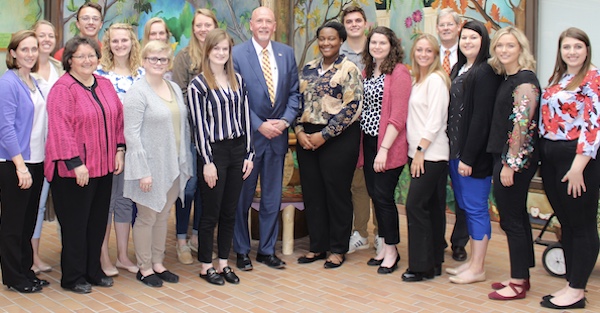
Head of USDA FSA Offers 5 Key Traits of Leaders
Ken Isley, head of the U.S. Department of Agriculture Foreign Agricultural Service, says countries should regulate food and agriculture based on science and data. His most powerful tool in international trade talks? The American farmer.
“Farmers have the most sincere voice in promoting U.S. ag exports. We love to engage them with overseas consumers whenever possible. They are our competitive advantage,” he says.
Isley (’84 agriculture and life sciences education) has roots in his hometown, Pleasantville, Iowa, and his family’s Warren County farm where he grew up showing cattle in 4-H and FFA.
As administrator of the USDA Foreign Agricultural Service, he leads 93 offices around the world in expanding trade and export opportunities for American agriculture – totaling approximately $140 billion in exports annually.
“We are working to reform long-term trade barriers with China,” Isley says. “We are focused on free, fair and reciprocal trade. Agriculture should be the big winner.”
Following graduation from Iowa State, he earned his juris doctorate from the University of Iowa College of Law and worked for a law firm before landing with Dow and Dow AgroSciences, where he worked for 29 years. Isley held various senior leadership roles, including vice president, general counsel and head of the company’s global legal department. He also was a special adviser for Corteva Agriscience.
During his tenure in Indiana working with Dow, he became acquainted with the governor at the time – Vice President Mike Pence, and USDA undersecretary, Ted McKinney.
When the call to serve the USDA came from Washington D.C. Isley accepted and was appointed to his current position in March 2018.
He says the Foreign Agricultural Service has three main roles: agricultural trade policy, trade promotion and data gathering and analysis.
“We establish international trade standards, have programs to market agricultural products overseas, work with USAID (United States Agency for International Development) to implement capacity building and development programs and gather and analyze data,” Isley says. “Our data is the gold standard around the world for tracking the supply and demand of key agricultural commodities.”
He works to ensure market access for U.S. products around the world and his agency supports the Office of the United States Trade Representative in ongoing trade negotiations and matters before the World Trade Organization.
“Building successful relationships is all about connecting people intellectually and emotionally,” Isely says. “We soak in the culture while on trade missions, hear from people and see key sites. These relationships lead to successful future trade opportunities.”
Isley returned to Iowa State University to present the 2019 Carl and Marjory Hertz Lecture on Emerging Issues in Agriculture, “The Role of the U.S. in the Global Food and Agriculture Marketplace,” on April 9.
Danaisa Green, a sophomore in agriculture and society from Salisbury, Maryland, was among the students Isley visited with while on campus.
“His comments relate to three of my classes right now. He really makes me appreciate the material we’re covering and think about how I can apply it in real life,” Green says. “Mr. Isley’s position in the USDA demonstrates I can use my degree from Iowa State to pursue a diverse set of careers.”
In addition to sharing his insights and experiences on global trade. Isely shared the five key attributes he believes are essential for successful leaders:
1) Communicate: Be a good listener with the ability to discern fact from opinion and construct your own position. Be persuasive. Inspire people to follow you.
2) Be assertive: Take advantage of opportunities presented and create your own. Seize the moment and make your voice heard.
3) Live with urgency: Life is not like a marathon – you don’t know where the finish line is. Act with urgency in your faith, relationships, passion and mission.
4) Build trust: Be trustworthy with superiors, those you supervise and all around you. Work hard, confidently and with integrity.
5) Don’t be a victim: Empower yourself. Move from fear and paralysis to courage and action. Remove yourself from the situation if necessary, overcome adversity and move forward.



